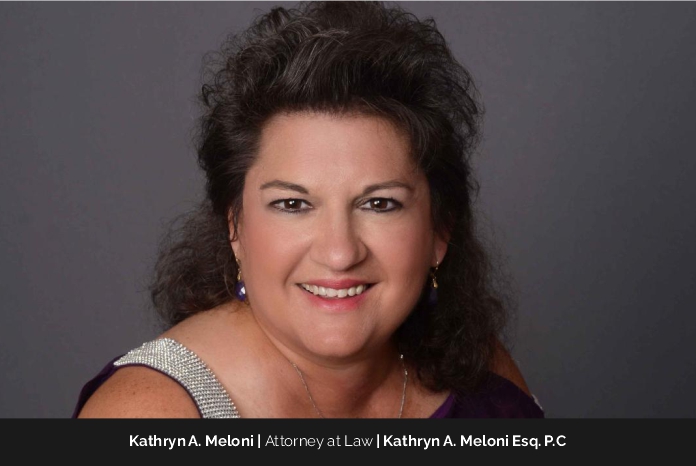In every profession, some focus solely on the work in front of them, and some see beyond the paperwork and the courtroom, toward the people whose lives are being shaped by the outcome. Kathryn A. Meloni has built her career on the latter approach. Her story is one of persistence, compassion, and a deep belief that the law should be a tool for resolution, not division. Over more than three decades, she has served not only as an advocate for her clients but also as a leader in her community, a mentor to future attorneys, and a tireless supporter of causes that extend well beyond the courtroom.
Discovering Purpose in the Law
Kathryn’s path to law was not a conscious one at first. “I was nudged into law by my dad and a professor, really,” she remembers. As a Criminal Justice major with minors in both psychology and sociology, Kathryn originally hoped to become a psychologist or social worker, inspired to help people navigate difficult times. Being nudged into law by her father and a professor gave her an unexpected path, one where she could apply her curiosity about human behavior to influencing life-altering decisions.
That early training set the stage for a career distinguished by a people-first philosophy. Rather than seeing the practice of law as a relentlessly procedural endeavor, she practiced it as an art of conflict resolution that strives to preserve relationships, especially in the sensitive realm of family law.
An Approach Rooted in Resolution
Kathryn’s motto is short but strong: court should be a last resort. “I always attempt to resolve cases on a friendly basis in the best interest of my client,” she says. “Litigation is combative and adversarial, and it tends to sow more seeds of trouble.” In family law, where emotions run high, she attempts to draw lines of communication rather than cause more strife. “It’s worked for me,” she says. “I’m a go-to attorney for sensitive matters, ranging from custody arrangements to dysfunctional family disputes.”
Beyond family law, Kathryn also assists clients with adoptions, estate documents, probate of estates, and various other matters such as name changes and guardianship issues. Her dedication to resolution is brightest in situations closest and dearest to her heart, adoptions. With children and youth services, private adoptions, and step-parent and adult adoptions, Kathryn takes pleasure in facilitating moments that change lives for the better. “They are wonderful,” she smiles.
Overcoming Challenges with Dignity
The practice of law has changed since Kathryn started practicing, and not necessarily for the best. “Lawyers certainly don’t enjoy the respect they used to have and don’t always get what they used to get,” she says. She has struggled with the juggling act of clients’ expectations and the bottom-line economics of maintaining a law office. The cost of insurance, rent, and employees is not always visible.
Kathryn is honest in trying to keep costs and legal fees to the barest minimum, while ensuring the delivery of value in every situation. Her commitment to transparency and fairness has helped her build long-lasting relationships with clients who trust her judgment both inside and outside the courtroom.
Balancing Commitment and Me Time
For Kathryn, there is no such thing as finishing work, but she has learned to set boundaries. “It is difficult, and I will check e-mails on holiday or at weekends,” she acknowledges. But she protects her private phone number zealously to preserve moments of healing. This is a boundary that allows her to heal but stay on call when the moment is critical.
Her own management style in her own office is also balanced in the same manner. She works with her own team in collaboration, creating a culture that makes collaboration yield quality. It has served her well as a leader, both as President of the DCBA Young Lawyers Division, Chair of the PBA Young Lawyers Division, and Chair of the DCBA Family Law Section.
Commitment to Lifelong Learning
In the constantly changing legal landscape, Kathryn knows that to stay in the game is to stay up to date. While mandatory continuing legal education is required for all lawyers, she never stops at the bare minimum. “I also teach Family Law in the Villanova School of Continuing Education Paralegal Certificate Program, where I have been teaching for 29 years,” she proudly declares. Teaching keeps her on her toes, in touch with what’s new, and connected with the next generation of legal professionals.
Her classroom demeanor is as close to her courtroom demeanor as the reserved, thoughtful, and problem-solving individual she has become. She thinks that negotiation and mediation skills are as essential as litigation skills, particularly in the field of family law.
Shaping the Future of the Legal Profession
Kathryn would like to see the next generation of attorneys show up for work with empathy and a view toward settlement. “For the sake of the parties and their families, mediation, negotiation, and the like must be used,” she says. She cautions against the win-at-all-cost mentality, particularly in family law, where the true victory is avoiding harm.
Her advice to young attorneys: “Don’t assume practicing law is all about being in court and battling the opposing side so one of them will triumph and the other will lose. That may be okay with a personal injury case, but not with family law.
A Legacy of Service and Integrity
Kathryn’s career as a professional is a singular combination of professional expertise and humane service. She has served as a board member with organizations such as Legal Assistance of Southeastern Pennsylvania and the ALS Association of Greater Philadelphia, and her volunteer work with PAWS for People in Newark, Delaware, is dearest to her heart. She has done this with her therapy dog, bringing comfort to the needy, even starting a program in the Delaware County Court of Common Pleas for the sake of those in Protection from Abuse Court and Dependency Court.
“Proud to do more for my clients than mere case work,” she goes on, sentiments that resound throughout her body of work.
For Kathryn, achievement is not defined by courtroom success alone, but by the integrity and compassion she infuses into all aspects of her practice. Her biography is a testament that law can be done with heart, leadership can be humble, and community service can be a part of a demanding profession.
Over the course of her career, Kathryn has been recognized with numerous honors, including the Delaware County Bar Association’s Nicholas D. Vadino Jr. Memorial Award, the President’s Recognition Award, and the prestigious Eric D. Turner Award. She has been named among Main Line Today’s Top Lawyers multiple times, received the Daily Times Reader’s Choice Best Lawyer distinction, and was honored with the County of Delaware Victim’s Rights Week Award. More recently, she earned the Talk of the Town Neighborhood Favorite Attorney recognition and the Martindale-Hubbell Distinguished Attorney Award, reflecting both her legal ability and her ethical standards.
Conclusion: The Measure of a Life in Law
In a professional life of over three decades, Kathryn has set the standard for what it is to be a lawyer in the contemporary era. She has demonstrated that law, in its finest meaning, is about building bridges, not walls. Her courtroom legal skills, her leadership of professional groups, and her civic philanthropy all bear witness to a steadfast commitment to the efficacy of compassion, honor, and reconciliation.
For Kathryn A. Meloni, success is not in billable time or courtroom wins but in lives transformed, communities improved, and the precedent established for those who will come after her. At a time in the life of the law when legal practice can be sterile and disconnected, her tale is a powerful reminder that law’s heart is still, and ever will be, about people.





